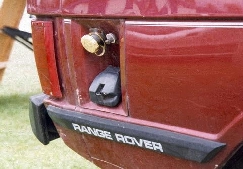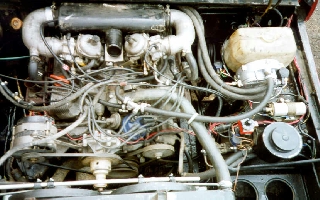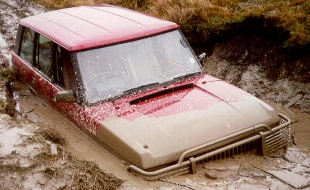|
The V8 engine in my Range Rover uses a lot of fuel. It does an excellent job of moving the vehicle. It is powerful, smooth, sounds great and for the most part does exactly what it is supposed to do at exactly the right time. But it uses a lot of fuel to do it. This makes me uncomfortable on two counts. Firstly it can get expensive, especially off-road, and secondly it is not awfully good for the environment. Now I did not buy the Range Rover expecting it to be an economical town run-about but even so 15 mpg (on a good day) can be off putting. There is also the ozone problem, smog and poor air quality to be considered. At least a couple of times I have contemplated the exhaust while it was belching thick noxious fumes first thing on a cold morning and wondered if maybe I was contributing more than my fair share to global warming.

Left: Simons Vogue in the throws of the LPG Conversion.
So I was convinced and took that car into Clean Air Vehicles Ltd to discuss the conversion. I opted to have two smallish tanks fitted under the sills. They attach to the chassis and tuck up out of the way quite neatly. Alternatively a tank can be fitted in the rear luggage area but I like to leave that area clear for sleeping in. These tanks are solid, built like er.. tanks really. Tests have shown that in accidents they survive much better than conventional petrol tanks. They are also fitted with pressure relief valves and manual isolating valves so all in they are probably much safer than normal fuel tanks. Two days later they were done. The vaporiser was tucked neatly into the engine bay and an extra switch had appeared on the dashboard. My first surprise was how well the engine ran. It is quieter and starts better, whats more I dont have to listen to the fuel pump ticking away maniacally.
I discovered later that it starts better because LPG easily and instantly mixes with air so that combustion is at its peak the minute the engine is started. Warming up is nowhere near as significant as with a conventional fuel. This makes an enormous reduction in pollution for short journeys. Round the back of the car I found my exhaust wondrously clean. For the most part the emissions really are mostly just hot air (could be appropriate for me, some might say)there is a subtle whiff of camping stoves which use pretty much the same gas and that is about it.

Right: The LPG filler is tucked up neatly by the petrol filler cap.
Another environmental benefit of LPG is that the system used for filling is 'closed', therefore the problem of spillage can be disregarded. LPG hardly contributes to "fuel filling pollution" which is a problem encountered with both petrol and diesel. In the first place this includes petrol fumes which form in the tank while driving and which escape when filling the tank, and as a result cause air pollution. In the second place, spillage is almost inevitable while filling the tank. Over the years, these few drops become a huge puddle of spilled fuel resulting in ground pollution, which at many filling stations seeps down several metres deep. This "fill pollution" has become such a major issue that in the near future the government will demand closed systems for all types of fuel. Petrol powered engines are easily converted to LPG and enjoy the LPG benefits of:
-little contamination of engine oil
-extended life of spark plugs
-higher octane number
-driveability similar to petrol
-clean efficient combustion
-lowest life-cycle greenhouse gas emissions of all commercially available fuels
-approximately 50% of the ozone-depleting potential of -gasoline
-low levels of sulphur dioxide and thus acid rain
-low particulates produced during combustion
-little or no damage to soil and water if it's spilled, due to its rapid evaporation 
Left: The main modifications in the engine bay are the vapouriser on the right and connections from it to the collars fitted just before the carburetors.
The Range Rover is getting a fair bit of use for off-road work these days so it is superficially looking a bit beaten up. I actually maintain it quite well so underneath the bodywork everything is very solid. I have had it about seven years and it was converted to LPG about 5 years ago - a move which I whole-heartedly endorse. It has an internal roll cage from Safety Devices. I once rolled a Land Rover (SIII LWB) and since then have felt very aware that Land Rovers in general do not give much protection if they roll over. I also fitted dual Kenlowe electric fans and am very impressed by these. They make it much quieter, improve fuel economy and allow the engine to get to temperature much, much faster. It has a second battery and split charging system which is very handy when I take it camping. I have fitted two voltmeters, oil pressure and vacuum gauges plus a sump guard. Otherwise it is fairly standard. 
Right: Off roading taken to new levels of wettness...
For short trips involving a cold start, LPG is preferred by far over petrol. The results of a study carried out by Renault in May 1993, show the reduction of harmful exhaust fumes:
-reduction of carbon monoxide (CO) 94%
-reduction of hydrocarbons (CH) 88%
-reduction of nitrogen oxides (NOX) 75%
Overall, I am delighted with the conversion to my Range Rover. The only disadvantage of using LPG is that it is not as widely available as other fuels, but as I still have the capability to use petrol I am never going to get really stuck. Apparently when I change the engine oil (still another few thousand miles yet) I can expect it to still be clean. By using LPG I am certain that my Range Rover is polluting less than just about any other car on the road, even on the short trips which I previously avoided.
Simon Salter |

